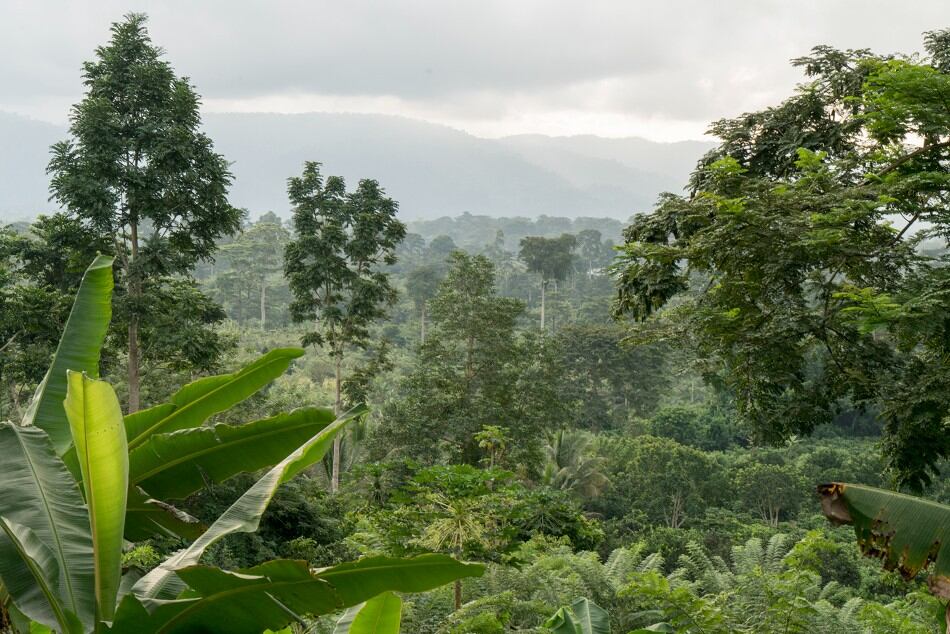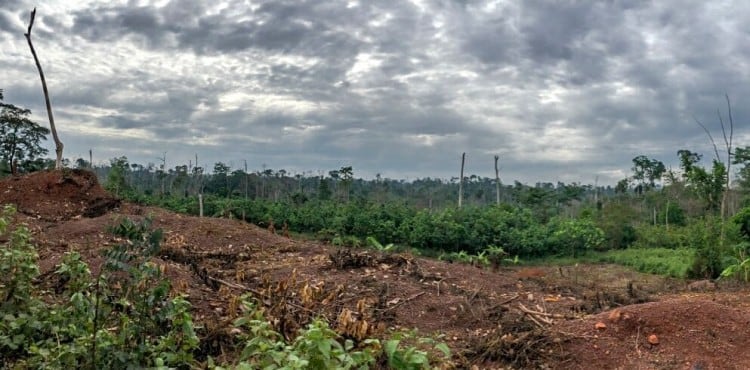Ghanaian landscape solutions to combat deforestation
On 3 December, the WCF and IDH, alongside the Ghanaian Minister for Lands and Natural Resources, unveiled the groundbreaking efforts of CFI in fostering sustainable forest conservation partnerships in Ghana’s Asunafo-Asutifi area.
The public-private partnership in Ghana involves designing and implementing landscape-wide solutions to environmental challenges, focusing on combating deforestation due to logging and agricultural expansion. In this first phase of the CFI Landscape Programme, cocoa and chocolate companies are playing a leading role in funding and launching these projects, which go beyond their direct supply chains, to investing in the production areas around them.
Samuel A.Jinapor, Minister of Lands and Natural Resources, Ghana, said: “Under the CFI umbrella, we must increase investments in priority landscapes. And we must adopt effective monitoring and reporting systems to assess progress on the implementation of this initiative to ensure the principal objective of halting deforestation and forest degradation in the cocoa supply chain is achieved in the long term.’’
Ivorian deforestation prevention progress unveiled
On 4 December, the WCF, IDH, and the Ivoirian Minister of Water and Forests showcased the progress and outlined the next phase of the Cocoa & Forests Initiative in the fight against deforestation in Cote d’Ivoire.
Updates on the Ivoirian program emphasized collaborative efforts in forest conservation, land restoration, and community support within the landscapes of Yapo-Abbé and Bossématié. Building on the success of the earlier phases, CFI is incorporating landscape approaches into its strategy, focusing amongst others on the preservation and rehabilitation of the Classified Forest of Yapo-Abbé and Natural Reserve of Bossématié. CFI participating companies and donors are committing to zero deforestation and promoting reforestation beyond production areas in their supply chains.
Laurent Tchagbo, Minister of Water and Forests, Côte d’Ivoire, said:“Our country is extremely proud to be among the first signatories of this important initiative, to sow the seeds of a fair, sustainable cocoa sector. To achieve this, together we must follow an agricultural development path that reconciles preservation of the forest and improvement of the living conditions of producers. The promotion of sustainable cocoa farming is possible in Ivory Coast through decoupling agriculture and deforestation. We are resolutely committed to it."
Public-private collaboration
In a statement, the WCF said the CFI landscape approach aligns seamlessly with national policies such as the Ivorian national forest policy and the Ghana Cocoa Forest REDD+ Programme (GCFRP), aiming to create a deforestation-free supply chain over a three-year project period. The Asunafo-Asutifi landscape management plan, a priority Hotspot Intervention Area in Ghana under GCFRP, seeks to establish a collective-action platform toward a deforestation-free and climate-resilient production landscape, improving the livelihoods of cocoa farmers.
Across both nations, national traceability systems entered the piloting phase and the national guidelines for the African Regional Standard for Sustainable Cocoa have been drafted. These policy developments, combined with the EU Deforestation Regulation, are poised to bolster the voluntary commitments of CFI, driving further progress towards a shared vision of a deforestation-free cocoa industry.
Joint vision
In both Côte d’Ivoire and Ghana, the Cocoa & Forests Initiative invites private sector and government collaboration to elevate ambitions, aligning with global frameworks for a deforestation-free cocoa sector. Objectives include reducing deforestation, rehabilitating degraded land and forests, promoting climate-smart cocoa production through agroforestry, improving land and tree tenure, enhancing livelihoods, and strengthening governance.
Chris Vincent, President of the World Cocoa Foundation, said: “In the face of rising challenges, the Cocoa & Forests Initiative stands as a testament to the power of collaboration. Acknowledging the urgency, we recognize that merely acknowledging the issue is not enough. Deforestation demands not just attention, but action. Through the evolution of CFI, we have made good progress in traceability and agroforestry. Now, with this significant advance in landscape approaches, we are seeking to achieve even greater impact—conserving forests and restoring degraded lands – through collaborative investment by cocoa and chocolate companies outside their supply chains alongside government partners.”
Daan Wensing, CEO of IDH, concluded: "The Cocoa & Forests Initiative is a strong partnership that continues to facilitate public-private collaboration in a sector under high pressure. To reverse the increasing trend of deforestation in West Africa, all actors need to step up, mobilize resources and move forward in public-private partnerships. The landscape approach is one way to realize our collective ambition of restoring the forest and supporting the communities who depend on them."
Agriculture Innovation Mission for Climate (AIM for Climate)
Meanwhile, The Agriculture Innovation Mission for Climate (AIM for Climate), a global initiative spearheaded by the United Arab Emirates and the United States, announced more than doubling of investments, partners, and 'Innovation Sprints' in transformative climate-smart agriculture and food systems innovation, at the COP28 conference.
Ahead of the final day of COP28 (Tuesday, 12 December), AIM for Climate, with the support of over 600 government and non-government partners, announced an increased investment of more than $17 billion, up from $8 billion at COP27, representing a more than doubling of investments.
AIM for Climate introduced 27 Innovation Sprints, initiatives led and self-funded by partners to achieve expedited results in agricultural and food systems innovation. There are now 78 Innovation Sprints in total, more than double what was announced at COP27, aligned with one or more of AIM for Climate’s Innovation Sprint focal areas: Smallholder Farmers in Low- and Middle-Income Countries; Emerging Technologies; Agroecological Research; and Methane Reduction.
Dignitaries at the event emphasised the urgent need for innovative approaches in agriculture and food systems to confront the climate crisis. Additionally, they highlighted the importance of investing in climate-smart agriculture and food systems, demonstrating how AIM for Climate partners and Innovation Sprints are driving innovation through new investments.


